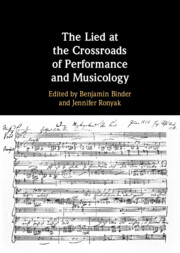Book contents
- The Lied at the Crossroads of Performance and Musicology
- The Lied at the Crossroads of Performance and Musicology
- Copyright page
- Dedication
- Contents
- Figures
- Tables
- Music Examples
- Contributors
- Foreword
- Acknowledgments
- Introduction
- 1 In Search of Song
- 2 Max Heinrich, “Wizard of Song”
- 3 Fragmenting Frauenliebe und -leben
- 4 Robert Schumann’s “Ich grolle nicht”
- 5 Schubert’s Mignon and Reimann’s Mignon
- 6 Locating the Wanderer’s Solitude in Choral and Nonsolo Performances of Winterreise
- 7 Analysis, Performance, and the Deep Nineteenth Century
- 8 Crossing Boundaries
- 9 Singers Speak about Musicology and Performance
- Bibliography
- Index
2 - Max Heinrich, “Wizard of Song”
Dramatizing Lieder for American Audiences
Published online by Cambridge University Press: 09 February 2024
- The Lied at the Crossroads of Performance and Musicology
- The Lied at the Crossroads of Performance and Musicology
- Copyright page
- Dedication
- Contents
- Figures
- Tables
- Music Examples
- Contributors
- Foreword
- Acknowledgments
- Introduction
- 1 In Search of Song
- 2 Max Heinrich, “Wizard of Song”
- 3 Fragmenting Frauenliebe und -leben
- 4 Robert Schumann’s “Ich grolle nicht”
- 5 Schubert’s Mignon and Reimann’s Mignon
- 6 Locating the Wanderer’s Solitude in Choral and Nonsolo Performances of Winterreise
- 7 Analysis, Performance, and the Deep Nineteenth Century
- 8 Crossing Boundaries
- 9 Singers Speak about Musicology and Performance
- Bibliography
- Index
Summary
Even as late as the 1880s singers attempting to integrate the Lied into US concert life confronted a variety of barriers; in addition to difficulties of the German language, audiences preferred large-scale works and assumed the Lied was a rarified genre. Nevertheless, Max Heinrich (1853–1916), the acclaimed “Wizard of Song,” succeeded through performances that captivated audiences and immersed them in the world of each song, be it an intimate lyric or a dramatic ballad. His style and the critics’ reception of his recitals are compared with those of the equally famous baritones of his day, George Henschel and David Bispham. Although Heinrich did not make recordings, his philosophy that performing Lieder rested on a singer’s intellect is documented by numerous publications, including his annotated English-language scores of over 150 Lieder. His distinctive subjective performativity is explored through reviews and a discussion of Schumann’s “Die beiden Grenadiere.” At times critics observed that Heinrich’s interpretations did not conform to the published scores, and thus were in violation of the Werktreue tradition that was characteristic of Henschel. Yet highly perceptive critics, such as Philip Hale, acknowledged that his original interpretations encouraged listeners to perceive well-known pieces in new ways.
Keywords
- Type
- Chapter
- Information
- The Lied at the Crossroads of Performance and Musicology , pp. 34 - 54Publisher: Cambridge University PressPrint publication year: 2024



